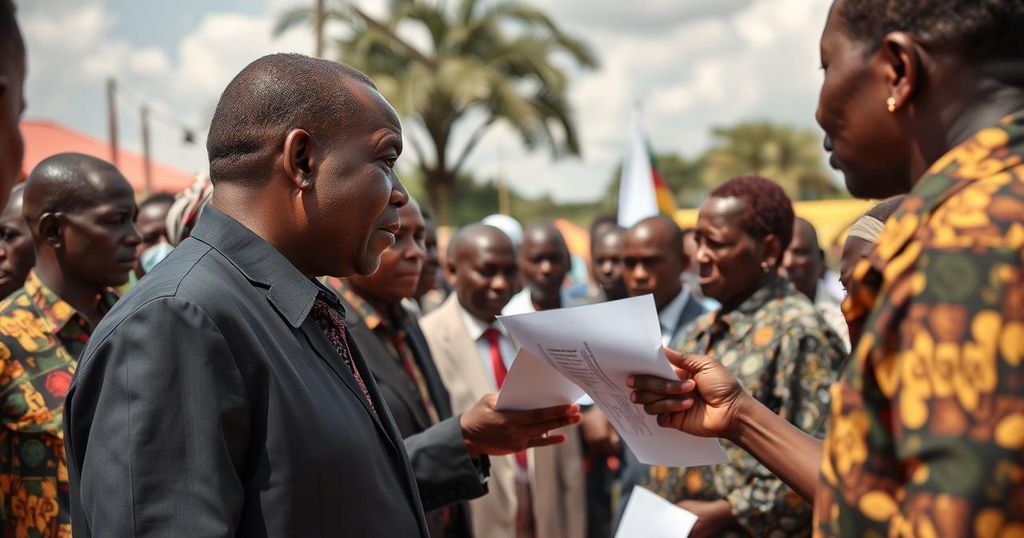Mozambique’s recent elections have sparked controversy as opposition candidate Venancio Mondlane claims massive fraud, despite official results showing FRELIMO’s Daniel Chapo winning. Allegations include voting irregularities and even the participation of foreign citizens, complicating the electoral landscape and raising questions about the fairness of the results. Renamo’s position as the primary opposition party is jeopardized, with new contenders like Podemos emerging.
The tumult surrounding Mozambique’s recent elections, marked by claims of widespread fraud, is intensifying as results emerge favoring the ruling party, the Liberation Front of Mozambique (FRELIMO). While FRELIMO’s candidate, Daniel Chapo, appears set to secure victory, opposition contender Venancio Mondlane has asserted that electoral malpractice marred the electoral process. Mondlane, who has recently distanced himself from the opposition party Renamo to contest independently, declared, “What we are seeing here is election rigging of the highest order,” emphasizing a perception of systematic electoral fraud that has plagued past elections. According to preliminary figures, Chapo has garnered approximately 53.68% of the votes in the capital, Maputo, with Mondlane receiving 33.84%. Renamo’s chairman, Ossufo Momade, and Lutero Simango of the MDM party lagged significantly behind. The FRELIMO leadership, however, defends the reported outcomes, claiming they accurately reflect the electorate’s will. As the election unfolds in Cabo Delgado, a region beset by violence, FRELIMO also reports a dominant showing with about 66% of the vote. These results raise alarms about Renamo’s grip on opposition politics, particularly with the emergence of Podemos, a party that has supported Mondlane and could potentially usurp Renamo’s status as Mozambique’s primary opposition. Following a contentious civil war in the past, Renamo demands a recount in specific districts where they assert their representatives were obstructed from observing the vote. Manuel de Araujo, the governor candidate for Renamo, launched an initiative abroad to highlight alleged electoral infringements and called for transparency: “There was organized disorganization by the electoral authorities,” he noted. Furthermore, serious implications arise from allegations regarding the participation of Zimbabwean voters in the election, raising questions about the legality of voting practices tied to foreign party affiliations. Reports indicate that these incidents, involving citizens of Zimbabwe casting votes without Mozambican identification, potentially taints the integrity of the election process. The connections between Zanu-PF and FRELIMO complicate the political landscape further, suggesting an intertwining of support that may influence electoral outcomes across borders.
The political environment in Mozambique has been historically turbulent, particularly in the aftermath of a civil war between FRELIMO and Renamo. Since Mozambique’s independence in 1975, FRELIMO has maintained power, often amidst allegations of electoral fraud. The current electoral proceedings have come under scrutiny, particularly with recent claims from the opposition that systematic cheating has disrupted the voting process. Renamo, having previously attempted legitimate governance, faces a potential erosion of power as new political entities like Podemos gain traction in the opposition landscape. Moreover, the involvement of foreign citizens in the electoral process raises significant legal and ethical concerns regarding the legitimacy of elections.
The unfolding events in Mozambique’s elections reveal significant tensions between the ruling FRELIMO party and the opposition candidates, particularly regarding allegations of electoral fraud. While initial results favor FRELIMO, the claims made by Mondlane and other opposition leaders could lead to serious scrutiny and possible investigations into the electoral process. In light of foreign participation allegations, the integrity of Mozambique’s democratic practices remains at stake, potentially altering the political landscape in the nation.
Original Source: www.dw.com







